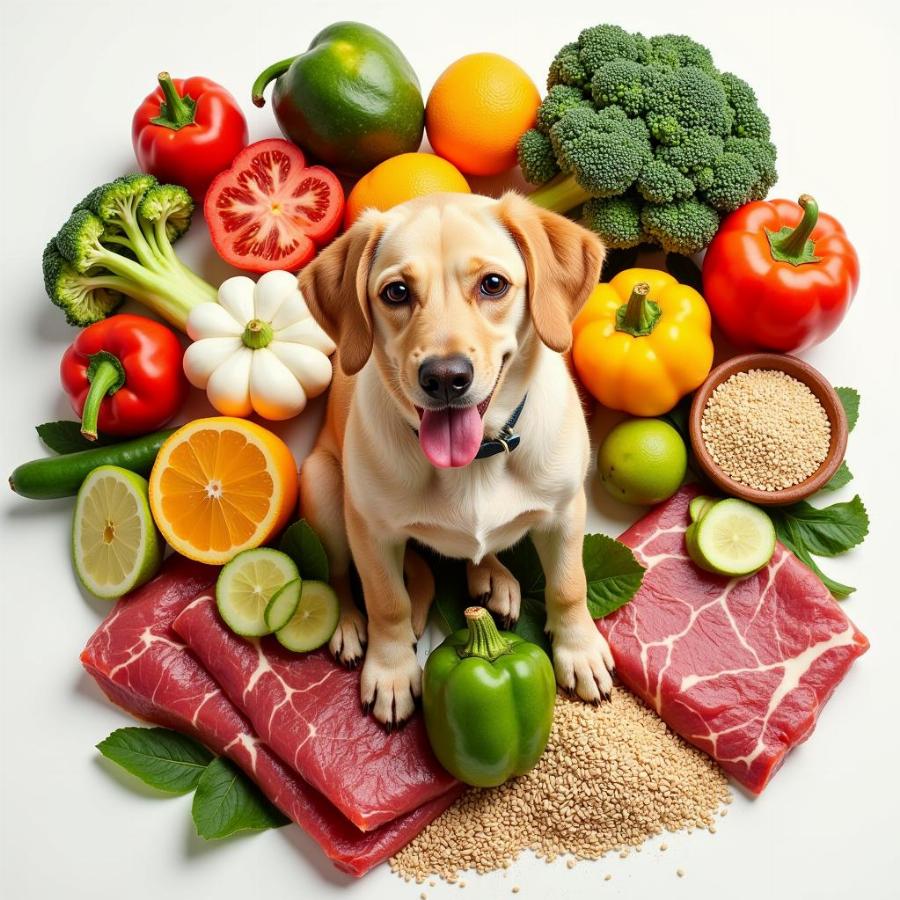The phrase “Jacky’s Hot Dogs Menu” might conjure up images of juicy frankfurters and savory toppings, but for the discerning dog owner, it raises a different question: what should be on my dog’s menu? While hot dogs aren’t typically recommended for canine companions, this search term suggests an interest in canine cuisine. So, let’s ditch the hot dogs and delve into creating a balanced and nutritious diet for your furry friend, ensuring they stay happy, healthy, and full of energy.
Understanding Your Dog’s Nutritional Needs
Every dog is an individual, and their dietary requirements vary depending on breed, age, activity level, and health conditions. Just like us, dogs need a mix of proteins, carbohydrates, fats, vitamins, and minerals to thrive. A balanced diet will support healthy growth, strong muscles, shiny coat, and overall well-being. Understanding these needs is the first step towards creating a “Jacky’s Hot Dogs Menu” – a menu fit for a canine king or queen, even if it doesn’t include actual hot dogs.
 Balanced Dog Food Ingredients
Balanced Dog Food Ingredients
Choosing the Right Dog Food
With countless dog food brands and varieties available, navigating the pet food aisle can be overwhelming. Should you choose kibble, canned food, or a raw diet? The answer depends on your dog’s individual needs and your lifestyle. Kibble is convenient and cost-effective, while canned food is often more palatable for picky eaters. Raw diets require careful planning and preparation to ensure nutritional balance. Consult with your veterinarian to determine the best option for your furry companion.
Homemade Dog Food: A Labor of Love
For those seeking complete control over their dog’s diet, preparing homemade meals can be a rewarding experience. However, it’s crucial to work with a veterinary nutritionist to create recipes that meet all of your dog’s nutritional needs. Improperly balanced homemade diets can lead to deficiencies and health problems.
Treats and Supplements: Everything in Moderation
Treats can be a great way to reward good behavior and strengthen your bond with your dog. However, they should be given in moderation to avoid weight gain and nutritional imbalances. Choose healthy treats made from natural ingredients and avoid those with artificial colors, flavors, and preservatives. Supplements can be beneficial for dogs with specific health conditions, but always consult your veterinarian before adding any supplements to your dog’s diet.
Common Dietary Concerns
- Food Allergies: If your dog exhibits symptoms like itching, digestive upset, or skin problems, they may have a food allergy. Identifying and eliminating the offending ingredient is essential.
- Obesity: Overfeeding and lack of exercise can lead to obesity, increasing the risk of various health issues. Maintain a healthy weight for your dog by providing portion-controlled meals and regular exercise.
What Should I Feed My Puppy?
Puppies require a diet specifically formulated for their rapid growth and development. Puppy food is typically higher in calories and essential nutrients than adult dog food.
Conclusion
Creating the perfect “Jacky’s Hot Dogs Menu”—a menu focused on nutrition, not hot dogs—for your beloved companion requires careful consideration of their individual needs. By understanding these needs and making informed choices, you can ensure your furry friend enjoys a long, healthy, and happy life. Remember to consult with your veterinarian for personalized dietary advice.
FAQs
- How often should I feed my dog? Most adult dogs thrive on two meals per day.
- What are the signs of a food allergy? Itching, digestive upset, and skin problems can be indicative of a food allergy.
- Is it safe to feed my dog table scraps? Some table scraps are safe in moderation, but avoid feeding your dog toxic foods like chocolate, grapes, and onions.
- How can I prevent my dog from becoming obese? Feed portion-controlled meals and ensure your dog gets regular exercise.
- What is the best type of dog food? The best type of dog food varies depending on the individual dog’s needs and should be determined in consultation with a veterinarian.
- Can I make my own dog food? Yes, but it’s crucial to work with a veterinary nutritionist to ensure a balanced diet.
- How many treats should I give my dog per day? Treats should be given in moderation and make up no more than 10% of your dog’s daily caloric intake.
Beaut Dogs: Your Trusted Source for Canine Care
Beaut Dogs is your one-stop shop for all things canine, offering expert advice and resources to help you provide the best possible care for your furry friend. From breed information to nutrition tips, we’re here to support you on your journey as a dog owner. When you need expert advice, please email us at [email protected] so that Beaut Dogs can answer in detail and accurately. Visit https://beautdogs.com today to learn more!